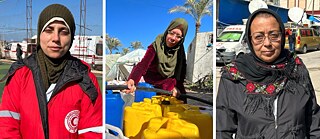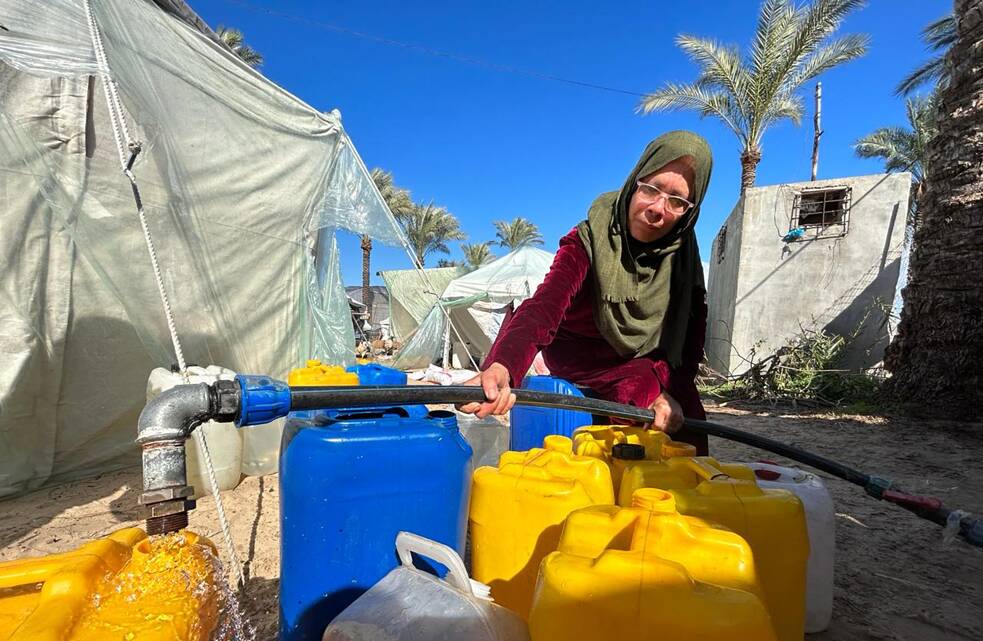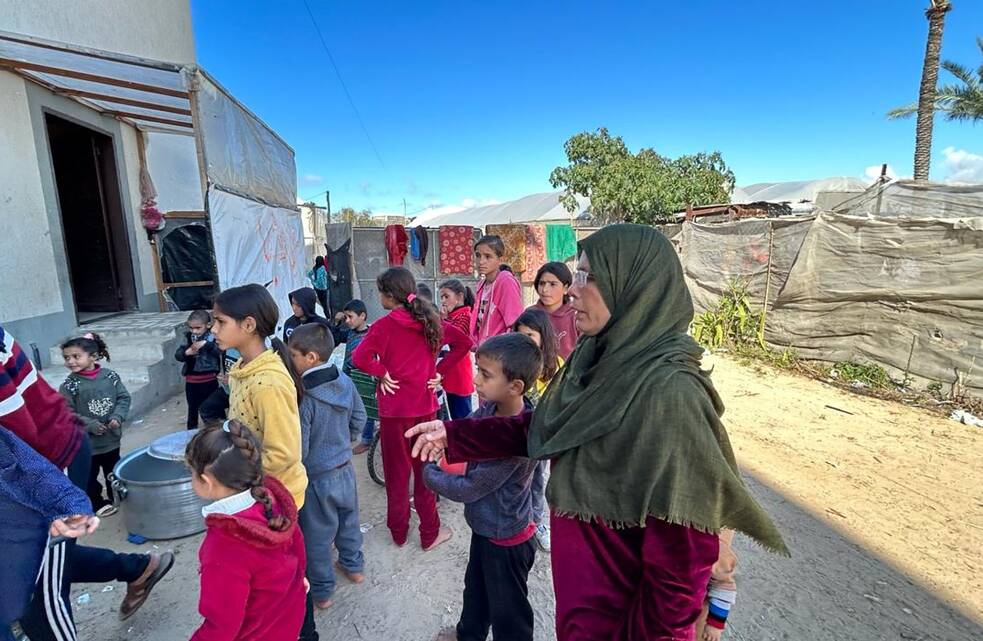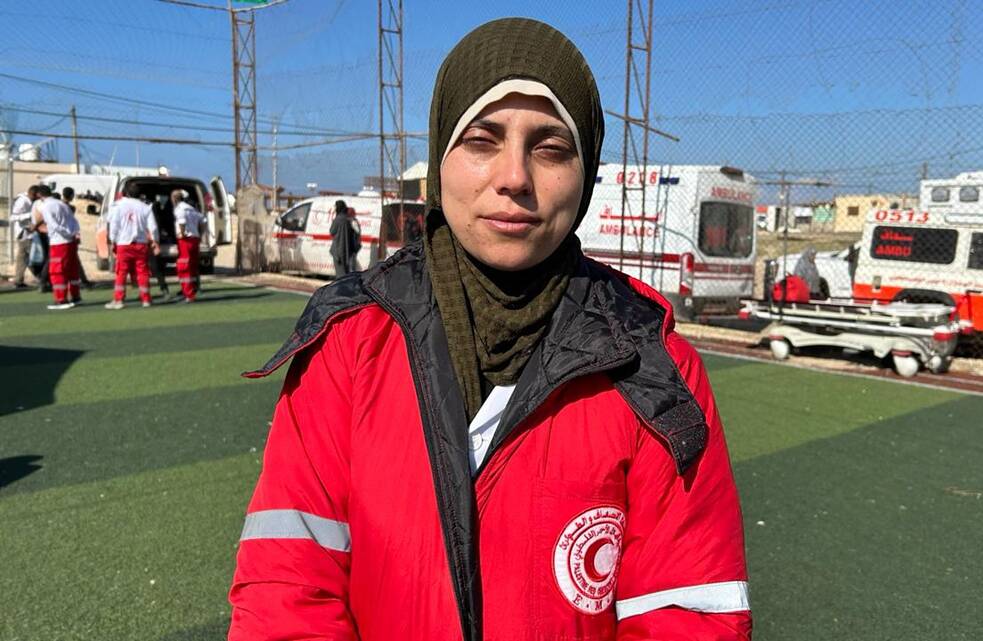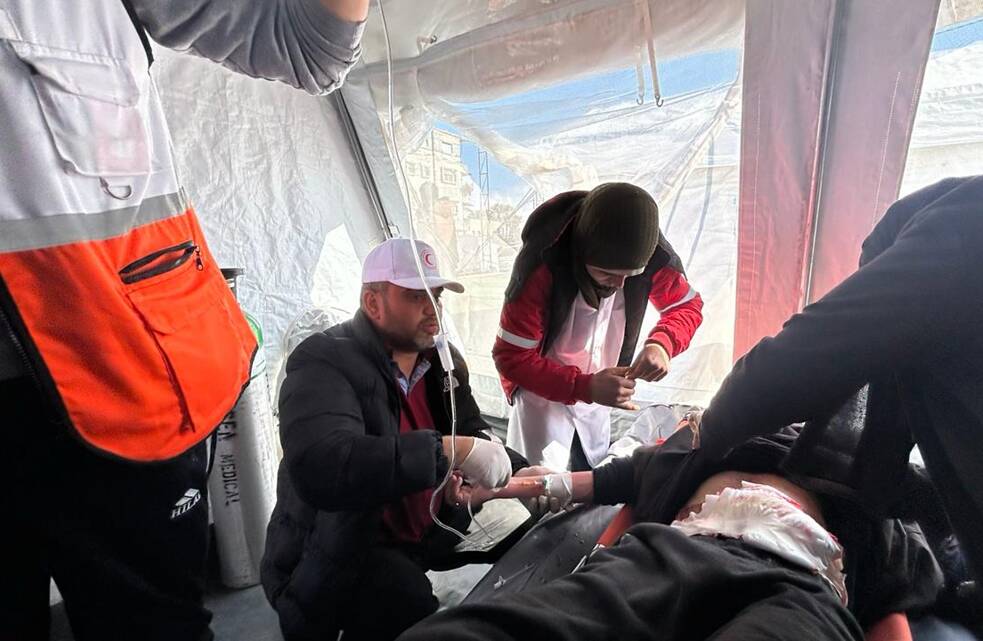Amidst a 10-month war that has claimed over 39,000 lives and has driven nearly 2.3 million Gazans on daily scavenges for the basic necessities to survive, women are facing disproportionate challenges, navigating displacement and violence alongside severe lack of hygiene products and inability to access essential healthcare. Nevertheless many women have become pillars of their communities, helping others wherever they can, providing much needed help and saving lives. Mohamed Solaimane met 3 of them in Gaza.
In her house-turned-shelter in Gaza’s Al-Mawasi, Enaam Al-Agha rolled her sleeves, and positioned herself to have a firm grip on the wide flour-filled aluminum bowl before her. Sinking her hands in the fine powder, this signaled to her daughter to begin pouring in water, bit by bit, waiting in between each portion for a subtle gesture from her mother to pour some more, as the 46-year-old Gazan woman goes about kneading the dough.The almost mechanical rhythm between the duo was established from the ritual being held on a daily basis.
As Al-Agha’s experienced fingers and hands knead away, masterfully toying with the dough to reach the aspired consistency, her eyes move around inquisitively to follow the progress of several other women sitting around her, each working on their own batches of dough.
The collective effort will later feed thousands of people.
Al-Agha, a mother of six, has become the caretaker of thousands of internally displaced Gazans who, fleeing Israel’s relentless gunpower, have sought shelter on her family’s farmland in Al-Mawasi, the strip’s narrow, barren, coastal district.
Amidst a 10-month war that has claimed over 39,000 lives and has driven nearly 2.3 million Gazans on daily scavenges for the basic necessities to survive, women are facing disproportionate challenges, navigating displacement and violence alongside severe lack of hygiene products and inability to access essential healthcare and medications for pregnant women and new mothers. While men are out trying to figure a way to keep their families alive, it falls on women - mostly in displacement tents - to recreate a life of normalcy for their families in terms of food, shelter, emotional and mental needs, and more, in the sharp absence of all that.
Under such unfathomable circumstances, many women like Al-Agha, are assuming multiple roles, extending their support and help beyond their own families, to also serve others.
“They have nothing: no clothes, no food, no home, nothing. May Allah be with them. They left everything behind and sought us for help. We couldn’t turn them away. We told them we’ll serve them whatever we have, and - with Allah’s generosity - we were able to serve them things,” Al-Agha, better known as Um Fathy, said.
Starting December, particularly after the brief and only truce in Israel’s ten-month relentless bombing of Gaza, and as Khan Younis came under Israeli extensive fire, followed by Rafah’s ground operation in May which triggered an exodus of displaced people to seek arid Al-Mawasi, Um Fathy and her family have converted their house, farmland, sheds and greenhouses into a displacement camp that hosts at least 2,500 people.
From dawn to dusk, Um Fathy paces the farmland, checking up on families. While her husband ensures that solar panels are functioning properly, that pumps operating the wells to provide clean water are in good shape, and that all newcomers are accommodates, Um Fathy compiles lists of non-food essentials like tents, beddings, diapers and infant formula milk, attends to distressed women and children, and communicates with relief organizations to ensure that the lists of needs are met and delivered to the individuals she hosts. In between all that, she bakes daily portions of bread to feed the thousands residing on her land and collaborates with relief organizations in preparing three meals to serve everyone.
She then repeats the cycle every day.
“It’s the least I can do, and the minimum I can offer. And all this is only a fraction of what these people need,” she said humbly. “What I have to offer is limited compared to what the IDPs need and does not suffice their needs that include food, clothes, and the private needs of women,” Um Fathy said.
“I have compassion for everyone; but women, children, and the disabled have special needs, and it is my job towards my country to help them”.
Medical Assistance Midst War
Maha Wafy, a 44-year-old ambulance officer and a mother, spends her days at work with the Palestinian Red Crescent (PSC). In between her job’s tasks, and at the end of each day of attending the wounded from the war, she returns to her tent in Al-Mawasi district where she tends to her five kids.Her husband has been missing since December: the health ministry employee was arrested by Israeli forces in southern Gaza while transporting patients from the north to the south in collaboration with aid organizations. There has been no news about his whereabouts since.
So, she relies on her eldest children Rahaf, who is 20, and Hamid who is 17, to look after the younger one.
“My strong sense of responsibility towards my society is what keeps me going,” says the mother as she takes her six-year-old son Ahmed in her arms and draws the other ones closer. “These are grave times, and we need to all put our share in helping,” she added.
With a 24-year-long career in the medical field, she said she lived through multiple wars in Gaza, and narrowly escaped death in one incident.
“This isn’t to say that I’m not terrified each morning when I leave my kids behind, or when I hear bombings that are close to where we’re staying. I die every second. But this is the reality we live in,” she said.
Based in a field hospital that was set up by the PRC in Al-Mawasi after December’s ground operation in Khan Younis, Wafy works with very little resources and scarce medications.
Frequently, Wafy would jeopardize her safety to do her job, as she considers herself on a humanitarian mission, pointing out that she feels piercing moments of helplessness when she hears bombings near the tent where her family is displaced; however, she quickly regroups and goes back to work with patients.
“I have a dangerous job in a time of war, in addition to being a mother. I have been their only parent for the duration of the war, and don’t know where my husband is. We live in a tent where we’re expected to lead a normal life,” Wafy said with a worn-out smile on her face.
The ambulance officer believes she has masterfully managed to accomplish all her duties thus far. On the one hand, she persistently continues her humanitarian and medical work to help those in need, and on the other hand, she supports her family while her husband is in prison at a time of war as she suffers from displacement and the absence of basic needs.
“I am a woman and I have amplified emotions. I cry alone but still insist on toughening up in front of my children to help them move forward with life against this gruesome war,” Wafy shared.
Journalists in Peril
On a different front, Ola Kassab helps Gazan on the social front.Kassab, a journalist and a member of the Palestinian Journalists Syndicate, spends her days providing humanitarian and technical support to hundreds of journalists in Gaza and their families.
“Gaza’s journalists are performing an indispensable role in this war, relating to the world what it would other not know of because there is no one else to tell this sad story of Gaza,” she said.
Mingling with journalists in the Kuwaiti hospital in Rafah, and elsewhere in the enclave, Kassab listens closely to their problems, whether technical, humanitarian or otherwise, then uses her wide network to connect them with those who can provide assistance.
She is particularly active in providing aid to young journalists who do not have consistent incomes to help their families during the war and the displacement that affected all those working in the media field.
She also visits families of journalists who were killed by Israeli gunfire throughout the war, and those who are injured, offering them emotional and financial support. To date, at least 108 journalists are among the 39,000 Palestinians who were killed in the war.
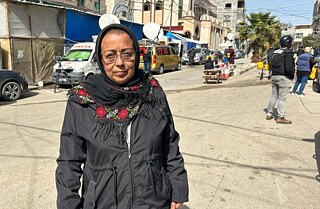
Ola Kassab a journalist and a member of the Palestinian Journalists Syndicate | ©Mohamed Solaimane
“We’re all one family. And this war has shown that we’re all in the same boat. It’s therefore essential that we support one another. Man or woman, it doesn’t matter. Whoever can lend a hand, should do so,” she concluded.
This piece is published in collaboration with Egab.
July 2024
